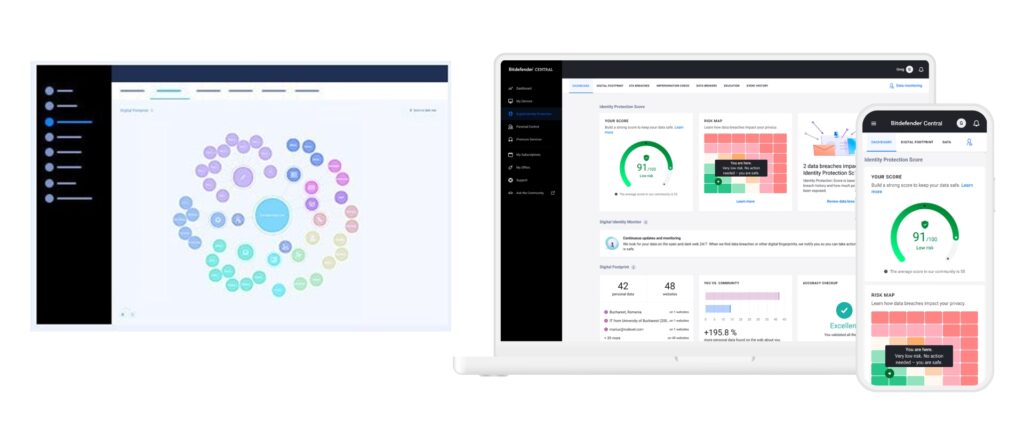It is almost impossible to browse the Internet without depositing personal data. Here are some recommendations for reducing your digital footprint and regaining control of your data.
Every time you go online, you leak personal information about yourself. This is the digital fingerprint. In the best case, this is used to target you with advertising. In the wrong hands, this information exposes you to greater risks such as phishing, identity theft or damage to your reputation.
Hence the importance of controlling a little the digital traces that you voluntarily and involuntarily deposit on the web. While some solutions like Bitdefender’s offer better control of your personal data, a few simple best practices already allow you to reduce your digital footprint.
Do I have a digital fingerprint too?
Everyone has a digital footprint. As soon as a person browses the Internet, he leaves certain data concerning him in his path. These can be communicated voluntarily, by ordering online, by creating a personal account, by submitting an opinion, by publishing a comment, or by being active on social networks. These digital traces are then qualified as “ active “.
Other personal data, on the other hand, is collected more insidiously. This imprint passive corresponds in particular to cookies, your IP address, your location, or your browsing history. This information is very valuable and allows certain specialized companies to deduce your consumption preferences, and therefore to send you targeted advertisements. This is why these data sell for gold on the market.
If it is annoying to receive pop-up ads, the risk associated with this data may be greater. In the hands of cybercriminals, they are capable of leading to phishing and even identity theft. Each year, more than 200,000 French people are victims of it.
A few key pieces of information are enough for kidnappers to apply for credits on your behalf. This is without counting that indirectly, certain publications, even old ones, can harm your e-reputation and prevent you from getting a job, for example.
It is therefore essential to limit its digital footprint, both active and passive. Here are some simple recommendations to implement to achieve this.
Clean up on social media
On social networks, surrounded by his friends, it is tempting to share certain moments of life, his moods of the day or his latest setbacks. So many publications that leave a strong digital footprint and can one day catch up with you.

Friendship or family conflicts, loss of credibility during the job search phase, burglary during vacation… The risks are numerous. This is without counting the information that identity thieves can reuse without your knowledge.
However, there is no need to rush to close your Facebook and Instagram accounts. First of all, it’s best that each of them is private, so that only your contacts can access your publications. A great opportunity to clean up your subscribers so that strangers or old acquaintances no longer get wind of all your actions.
Once these first steps are done, it’s time to go around your publications, photos and videos included. For each of them, ask yourself the question: Is this post likely one day to serve me or tarnish my reputation and therefore my credibility? “. If the answer is yes, feel free to delete it. Before enriching your feed, systematically question yourself in this way. Especially if your account is public.
Delete all unused personal and loyalty accounts
Almost all brands offer a loyalty program and to join, you no longer need to receive a physical card. A personal account is generally created on the basis of a name, a first name, an email, a date of birth and a telephone number. To open a new app, same fight.
So much scattered data, difficult to trace, and which is sometimes resold to third parties. This is why it is important to take stock and delete all accounts that have become useless. Going through emails, including spam, can be a good way to find them. This step is also an opportunity to unsubscribe from all superfluous newsletters that you no longer read.
More privacy and fewer cookies
All web browsers allow you to change privacy settings. Regularly, it is important to erase your browsing history, delete cookies and empty the cache.

Each web page you visit can deposit tracers, also called ” Cookies “. They are responsible for tracking your online activities, the sites you visit, the searches you perform, where you are located, and the software and applications you use.
An effective way to understand who you are, how you are equipped, what you like. The purpose of this data collection is to improve the service provided, the user experience, but also and above all to send you targeted advertising. With the GDPR (European Data Protection Regulation), websites must first ask for your consent before tracking you.
But these messages are so frequent that a number of Internet users mechanically click on ” accept without even realizing what this agreement entails. As much as possible, it is recommended to limit the collection to the strict minimum and to only visit safe and known pages.
Finally, it is always possible to use the private browsing option included in web browsers. No cookie is deposited and your IP like all your other browsing data is not transmitted to the site concerned.
Bitdefender: to know your digital footprint at a glance
To date, no single tool is capable of erasing all of a person’s digital traces and preventing them from changing. However, solutions exist to know the extent of its digital footprint.

Bitdefender offers a simple and effective solution to know what personal information is wandering on the web in plain sight, but also what sensitive data is compromised.
Bitdefender Digital Identity Protection delivers in a few clicks a relatively complete mapping of your online presence, including your data exchanged on the dark web. The application also alerts you in the event of a violation of your identifiers and passwords, so that you can immediately modify them and regain control of your accounts and your data.
To go even further, the solution constantly scans social networks and warns you in the event of identity theft or potential damage to your reputation.
This practical tool allows you to keep an eye on the state of your data and more broadly your online presence.
In addition, at the moment, Bitdefender Digital Identity Protection is available at only 35.88 euros for the first year, instead of the usual 69.99 euros.
